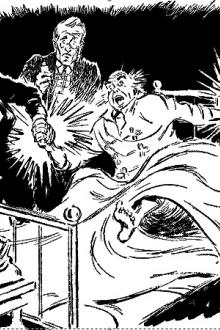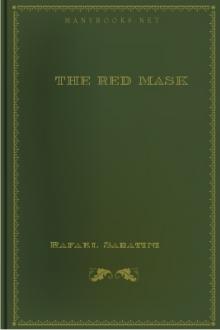The Face and the Mask - Robert Barr (comprehension books TXT) 📗

- Author: Robert Barr
Book online «The Face and the Mask - Robert Barr (comprehension books TXT) 📗». Author Robert Barr
"I'm not a whiner," said the young fellow; "I take my medicine like a man."
"Right you are," said Mellish with a sigh. He realized that this fellow, young as he looked, was probably deeper in vice than his appearance indicated and he knew the uselessness of counsel in such a case. They went into the main room together and the boy, abandoning roulette, began to play at one of the card tables for ever-increasing stakes. Mellish kept an eye on him for a time. The boy was having the luck of most beginners. He played a reckless game and won hand over fist. As one man had enough and rose from the table another eagerly took his place, but there was no break in the boy's winnings.
Pony Rowell was always late in arriving at the gambling rooms. On this occasion he entered, irreproachably dressed, and with the quiet, gentlemanly demeanor habitual with him. The professional gambler was never known to lose his temper. When displeased he became quieter, if possible, than before. The only sign of inward anger was a mark like an old scar which extended from his right temple, beginning over the eye and disappearing in his closely-cropped hair behind the ear. This line became an angry red that stood out against the general pallor of his face when things were going in a way that did not please him. He spoke in a low tone to Mellish.
"What's the excitement down at the other end of the room? Every one seems congregated there."
"Oh," answered Mellish, "it's a boy--a stranger--who is having the devil's own luck at the start. It will be the ruin of him."
"Is he playing high?"
"High? I should say so. He's perfectly reckless. He'll be brought up with a sharp turn and will borrow money from me to get out of town. I've seen a flutter like that before."
"In that case," said Pony tranquilly, "I must have a go at him. I like to tackle a youngster in the first flush of success, especially if he is plunging."
"You will soon have a chance," answered Mellish, "for even Ragstock knows when he has enough. He will get up in a moment. I know the signs."
With the air of a gentleman of leisure, somewhat tired of the frivolities of this world, Rowell made his way slowly to the group. As he looked over their shoulders at the boy a curious glitter came into his piercing eyes, and his lips, usually so well under control, tightened. The red mark began to come out as his face paled. It was evident that he did not intend to speak and that he was about to move away again, but the magnetism of his keen glance seemed to disturb the player, who suddenly looked up over the head of his opponent and met the stern gaze of Rowell.
The boy did three things. He placed his cards face downward on the table, put his right hand over the pile of money, and moved his chair back.
"What do you mean by that?" cried Ragstock.
The youth ignored the question, still keeping his eyes on Rowell.
"Do you squeal?" he asked.
"I squeal," said Pony, whatever the question and answer might mean. Then Rowell cried, slightly raising his voice so that all might hear:
"This man is Cub McLean, the most notorious card-sharper, thief, and murderer in the west. He couldn't play straight if he tried."
McLean laughed. "Yes," he said; "and if you want to see my trademark look at the side of Greggs' face."
Every man looked at Pony, learning for the first time that he had gone under a different name at some period of his life.
During the momentary distraction McLean swept the money off the table and put it in his pockets.
"Hold on," cried Ragstock, seemingly not quite understanding the situation. "You haven't won that yet."
Again McLean laughed.
"It would have been the same in ten minutes."
He jumped up, scattering the crowd behind him.
"Look to the doors," cried Pony. "Don't let this man out."
McLean had his back to the wall. From under his coat he whipped two revolvers which he held out, one in each hand.
"You ought to know me better than that, Greggs," he said, "do you want me to have another shot at you? I won't miss this time. Drop that."
The last command was given in a ringing voice that attracted every one's attention to Sotty. He had picked up a revolver from somewhere behind the bar and had come out with it in his hand. McLean's eye seemed to take in every motion in the room and he instantly covered the bartender with one of the pistols as he gave the command.
"Drop it," said Mellish. "There must be no shooting. You may go quietly. No one will interfere with you."
"You bet your sweet life they won't," said McLean with a laugh.
"Gentlemen," continued Mellish, "the house will stand the loss. If I allow a swindler in my rooms it is but right that I alone should suffer. Now you put up your guns and walk out."
"Good old Mellish," sneered McLean, "you ought to be running a Sunday- school."
Notwithstanding the permission to depart McLean did not relax his precautions for a moment. His shoulders scraped their way along the wall as he gradually worked towards the door. He kept Pony covered with his left hand while the polished barrel of the revolver in his right seemed to have a roving commission all over the room, to the nervous dread of many respectable persons who cowered within range. When he reached the door he said to Pony:
"I hope you'll excuse me, Greggs, but this is too good an opportunity to miss. I'm going to kill you in your tracks."
"That's about your size," said Pony putting his hands behind him and standing in his place, while those near him edged away. "I'm unarmed, so it is perfectly safe. You will insure your arrest so blaze away."
"Dodge under the table, then, and I will spare you."
Pony invited him to take up his abode in tropical futurity.
Cub laughed once more good naturedly, and lowered the muzzle of his revolver. As he shoved back his soft felt hat, Mellish, who stood nearest him, saw that the hair on his temples was grey. Lines of anxiety had come into his apparently youthful face as he had scraped his way along the wall.
"Good-night, all," he shouted back from the stairway.
OLD NUMBER EIGHTY-SIX.
John Saggart stood in a dark corner of the terminus, out of the rays of the glittering arc lamps, and watched engine Number Eighty-six. The engineer was oiling her, and the fireman, as he opened the furnace-door and shovelled in the coal, stood out like a red Rembrandt picture in the cab against the darkness beyond. As the engineer with his oil can went carefully around Number Eighty-six, John Saggart drew his sleeve across his eyes, and a gulp came up his throat. He knew every joint and bolt in that contrary old engine--the most cantankerous iron brute on the road--and yet, if rightly managed, one of the swiftest and most powerful machines the company had, notwithstanding the many improvements that had been put upon locomotives since old Eighty-six had left the foundry.
Saggart, as he stood there, thought of the seven years he had spent on the foot-board of old Eighty-six, and of the many tricks she had played him during that period. If, as the poet says, the very chains and the prisoner become friends through long association, it may be imagined how much of a man's affection goes out to a machine that he thoroughly understands and likes--a machine that is his daily companion for years, in danger and out of it. Number Eighty-six and John had been in many a close pinch together, and at this moment the man seemed to have forgotten that often the pinch was caused by the pure cussedness of Eighty-six herself, and he remembered only that she had bravely done her part several times when the situation was exceedingly serious.
The cry "All aboard" rang out and was echoed down from the high-arched roof of the great terminus, and John with a sigh turned from his contemplation of the engine, and went to take his seat in the car. It was a long train with many sleeping-cars at the end of it. The engineer had put away his oil-can, and had taken his place on the engine, standing ready to begin the long journey at the moment the signal was given.
John Saggart climbed into the smoking-carriage at the front part of the train. He found a place in one of the forward seats, and sank down into it with a vague feeling of uneasiness at being inside the coach instead of on the engine. He gazed out of the window and saw the glittering electric lights slide slowly behind, then, more quickly, the red, green, and white lights of the signal lamps, and finally there flickered swiftly past the brilliant constellation of city windows, showing that the town had not yet gone to bed. At last the flying train plunged into the country, and Saggart pressed his face against the cold glass of the window, unable to shake off his feeling of responsibility, although he knew there was another man at the throttle.
He was aroused from his reverie by a touch on the shoulder, and a curt request, "Tickets, please."
He pulled out of his pocket a pass, and turned to hand it to the conductor who stood there with a glittering, plated, and crystal lantern on his arm.
"Hello, John, is this you?" cried the conductor, as soon as he saw the face. "Hang it, man, you didn't need a pass in travelling with me."
"They gave it to me to take me home," said Saggart, a touch of sadness in his voice, "and I may as well use it as not. I don't want to get you into trouble."
"Oh, I'd risk the trouble," said the conductor, placing the lantern on the floor and taking his seat beside the engineer. "I heard about your worry to-day. It's too bad. If a man had got drunk at his post, as you and I have known 'em to do, it wouldn't have seemed so hard; but at its worst your case was only an error of judgment, and then nothing really happened. Old Eighty-six seems to have the habit of pulling herself through. I suppose you and she have been in worse fixes than that, with not a word said about it."
"Oh, yes," said John, "we've been in many a tight place together, but we won't be any more. It's rough, as you say. I've been fifteen years with the company, and seven on old Eighty-six, and at first it comes mighty hard. But I suppose I'll get used to it."
"Look here, John," said the conductor, lowering his voice to a confidential tone, "the president of the road is with us to-night; his private car is the last but one on the train. How would it do to speak to him? If you are afraid to tackle him, I'll put in a word for you in a minute, and tell him your side of the story."
John Saggart shook his head.
"It wouldn't do," he said; "he wouldn't overrule what one of his subordinates had done, unless there





Comments (0)